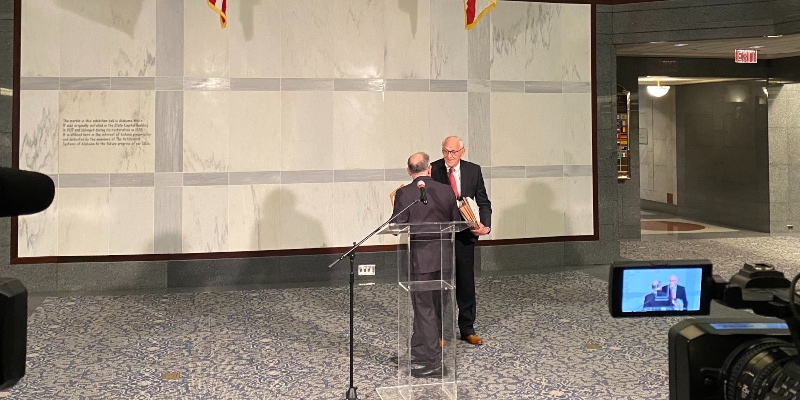
MONTGOMERY, Ala. — Alabama House Speaker Mike Hubbard (R-Auburn) announced Monday the formation of the Commission on Earmarking and Budget Reform.
“Prior to Republicans taking control of the budget process in 2011, proration had been declared six times in 10 years, but since passage of the Proration Prevention Act, also known as the Rolling Reserve, it hasn’t occurred once,” Speaker Hubbard said in a press release. “It’s my hope that this commission will recommend similar commonsense solutions to Alabama’s budget challenges so we can avoid the need for new taxes and ensure that funding for schools and state services is stable, secure, and completely transparent.”
The Commission, consisting of 7 members (5 Republicans and 2 Democrats), is tasked with studying Alabama’s budget-making process, how it stacks up to other states, and how it can be improved.
The Commission will meet multiple times over the next several months, compiling their recommendations to be delivered to the Speaker. The report is expected to inspire legislation simplifying and bringing accountability to the budgeting process to be introduced next session.
Hubbard said he believes the commission’s efforts will provide much needed flexibility in the budgeting process and build upon already successful Republican government reforms that were implemented during the last quadrennium.
The members of the Commission on Earmarking and Budget Reform are:
· Rep. Will Ainsworth (R-Guntersville)
· Rep. Elaine Beech (D-Chatom)
· Rep. Terri Collins (R-Decatur)
· Rep. Steve Clouse (R-Ozark)
· Rep. Allen Farley (R- McCalla)
· Rep. Bill Poole (R- Tuscaloosa)
· Rep. Rod Scott (D- Fairfield)
For decades, Alabama has constructed two separate budgets, the larger education budget which funds schools and other “educational” endeavors, and the general fund budget which funds Medicaid, corrections, the Department of Human Resources (DHR), and public safety. Only two other states—Michigan and Utah—have separate budgets. The majority of “growth” streams of revenue, those that increase as the economy improves, are relegated to the education budget, while the general fund subsists on flatter fees and taxes.
Within each of those budgets are hundreds of earmarks which require certain revenue streams to go toward particular programs. With 91 percent of Alabama’s tax revenues already earmarked, it is difficult for the state to prioritize spending in years where there are shortfalls.
This isn’t the first time Alabama leaders have suggested combining the two budgets. In early 2012 Governor Robert Bentley (R) made such a proposal, highlighting the growth problem facing the general fund.
“When you have two checkbooks, and you don’t have enough money in one and you do in the other one, what are you going to do at home? Well, you’re either going to move some money or you’re going to combine them,” Bentley said in January, 2012.
His proposal did not gain any traction at the time.
More recently, Senator Gerald Dial (R-Lineville) introduced a proposed Constitutional Amendment that would combine the two budgets and rid them of all earmarks, an effort he believes will not pass this year.
For Fiscal Year 2016, Alabama faces a $250+ million shortfall in the general fund, while the education fund has a surplus of approximately the same amount.
A number of proposals have been introduced during the 2015 regular legislative session to address the general fund’s shortfall, ranging from the governor’s proposed tax increases to instituting a lottery, though none have passed both houses of the legislature.
Thus far, only the House has passed a general fund budget, one which Governor Robert Bentley called “unworkable” and has threatened to veto which makes cuts to every program it funds, including Medicaid and corrections.
Like this article? Hate it? Follow me and let me know how you feel on Twitter!
— Elizabeth BeShears (@LizEBeesh) January 21, 2015












